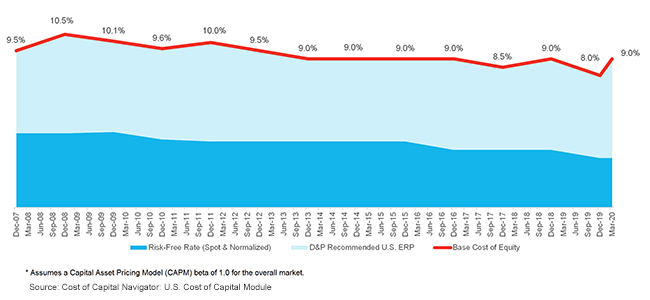
Duff & Phelps regularly reviews fluctuations in global economic and financial market conditions that warrant a periodic reassessment of the Equity Risk Premium (ERP) and accompanying risk-free rate, key inputs used to calculate the cost of equity capital in the context of the Capital Asset Pricing Model (CAPM) and other models used to develop discount rates.
The outbreak of coronavirus (COVID-19) has generated an unprecedented reaction to a global pandemic. Government policies of social distancing have led to supply chain disruptions and the closure of many businesses, harming business confidence; this has led to job losses in several industries, in turn hurting consumer confidence. Global equity markets have collapsed at a speed faster than observed during the 2008 global financial crisis. Equity volatility has reached record highs, while corporate credit spreads have surged. Economists have slashed real economic growth projections, with several sources predicting a global recession in 2020. Major central banks have begun to implement quantitative easing and other crisis-related measures employed during the 2008 financial crisis. Some governments are also in the process of approving or have already enacted sizable fiscal stimulus packages.
Based on current market conditions, Duff & Phelps is increasing its U.S. ERP recommendation from 5.0% to 6.0% when developing discount rates beginning on March 25, 2020 and thereafter, until further guidance is issued. To be clear, this means that for critical quarter-end valuations dated March 31, 2020, the recommended ERP is 6.0%. However, several economic and financial risk factors that we evaluate were already present during the week of March 9, 2020.
This ERP recommendation is to be used in conjunction with a normalized risk-free rate of 3.0%, implying a base U.S. cost of equity capital of 9.0% (6.0% + 3.0%).
Duff & Phelps will issue a more detailed Client Alert documenting the rationale behind the new recommendation.
Stay Ahead with Kroll
Valuation Services
When companies require an objective and independent assessment of value, they look to Kroll.
Business Valuation Services
Kroll is the largest independent provider of business valuation services.